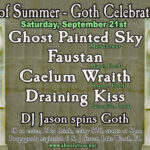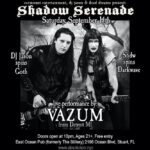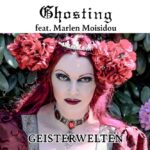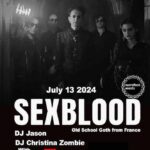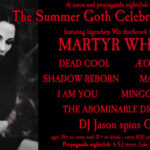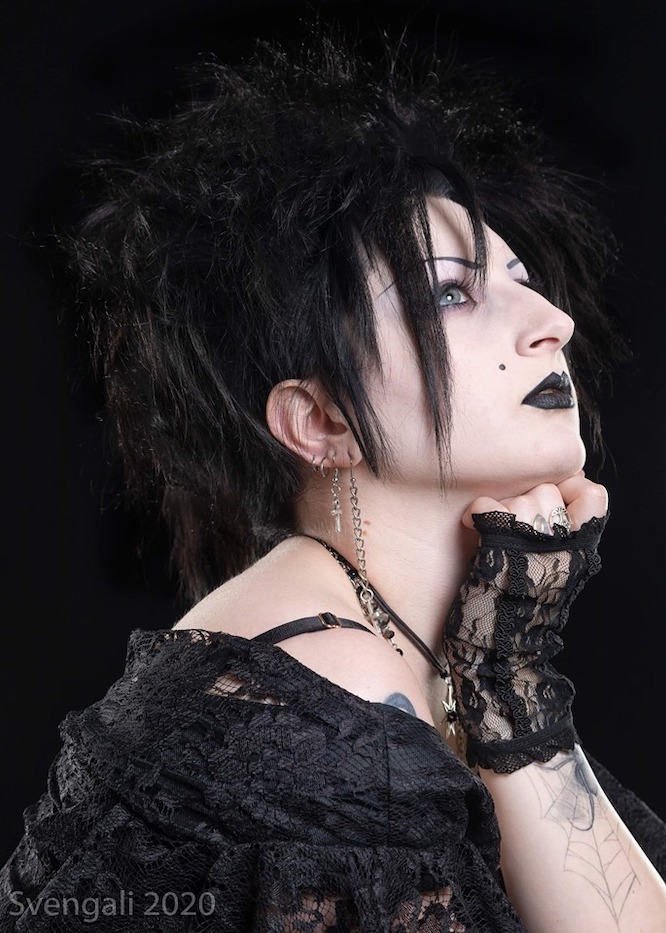
DJ Jason: Since you are a new artist, I should ask when Cemetery Siren was conceived and if there are any other band members. Tell us how you started, please.
Nyx: Cemetery Siren began in the summer of 2016. At the time, I was toying with an answer song to The Cure‘s “A Forest.” I liked the idea of something written from the perspective of the voice luring Robert into the trees, and ended up with a now lost song called Cemetery Siren. The name ended up sticking as the name of my project instead. I’ve tried a few times to bring other musicians into it, but I haven’t had much luck. Currently, Cemetery Siren is entirely mine, but I would love to put together a full band for live shows in the future.
Listening to your voice and instruments, I am reminded of Gitane Demone and The Shroud. Who are your main musical influences?
There are really so many, it’s been hard to narrow it down. If I had to pick just a few it would probably be London After Midnight, Claire Voyant, Switchblade Symphony, Cinema Strange, and Nox Arcana. I’ve always had a fascination with dark, mellow, almost ethereal music. I love slower, somber music that gives you a chance to breathe when you’re dancing in a club, and transports you to another world for a few minutes. That’s the kind of music I want to create.
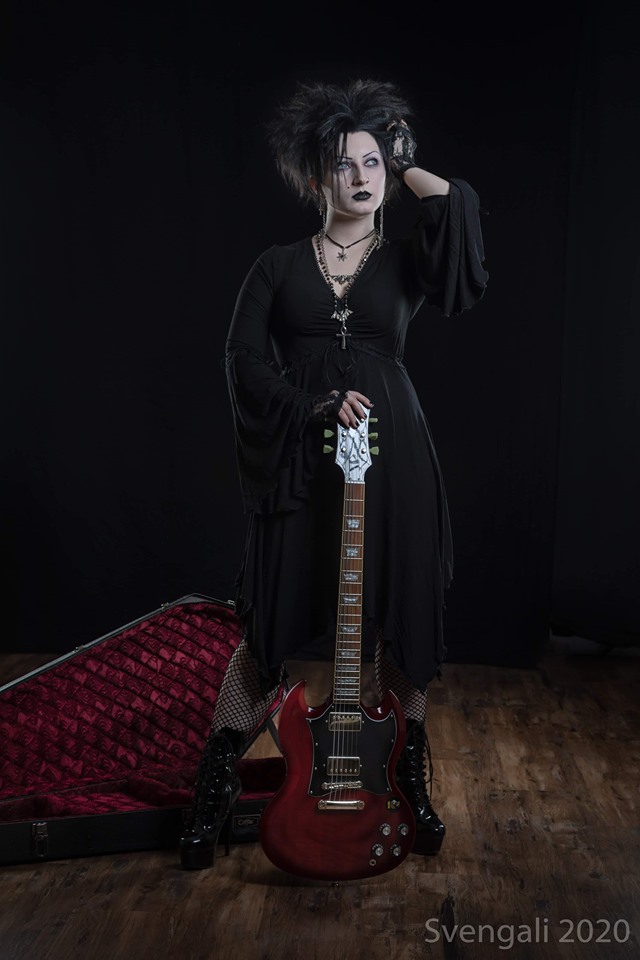
You also are a DJ. Would you like to tell us about what you do and what the Goth scene is like where you spin?
Nowadays, I just do guest spots here and there, usually for bigger events like Dark Arts or Goth Prom, but when I started out I was running a weekly goth night called Sacrilege. I like to play a decent mix of goth and goth-adjacent music instead of just the same old hits on repeat, so I did end up playing a lot of current musicians’ work as well as lesser-known older tunes mixed in with the popular goth bands from the 80s. Once I can find the time, I intend to start up a monthly night on the side of my day job, because I do miss it. As for our goth scene here… A lot of the bigger bands do come through on their tours, or stop in cities which aren’t too terribly far away. I’ve been lucky to see a handful of shows locally, including but not limited to Peter Murphy with David J., Redemption, Gary Numan, IAMX, Riverhead, The Moving Units, Cartilage Casanova, The Cure, All Gone Dead and My Life With The Thrill Kill Kult. We do have one small goth club called Area 51, and a handful of annual events that have all the goths lined up around the block and packing both dancefloors. Every Thursday is an industrial night called Tanz Machina, Fridays and Saturdays are typically 80s with a handful of goth hits, and the club does mix it up sometimes with various themed nights sprinkled throughout with guest djs and different genres – Coming up later this month SLC’s DJ Nothing will actually be hosting the first ever Wax Trax night, which should be exciting!
Also, have you found the experience of spinning music to have influenced your own song writing in any way?
I definitely think DJing brought to my attention the lack of bands out there with quite the sound and feel that really grabs me. I’ve always preferred to dance to the slow songs myself, and had a hard time finding a variety of bands I could play that really fit exactly the mood I wanted on the more melancholy nights and so I do want to help fill that gap – Maybe there will be someone else like me looking for that, and finding my work will resonate with them.
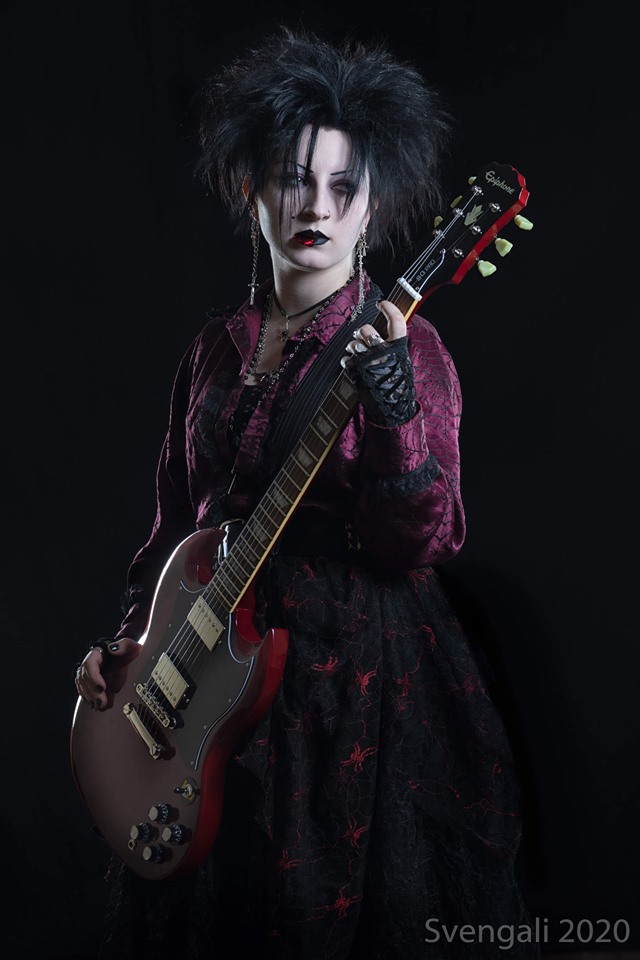
Has becoming a musician been an outgrowth of your work in the clubs?
Not at all. I’ve been a musician for as long as anyone can remember. As a child, I was glued to my grandmother’s piano every time my dad brought us over to visit. I received a 3/4 size classical guitar for my birthday one year, and quickly got to work learning chords. I’ve been singing for as long as I can remember, the first performance I recall being an open mic at a local bluegrass festival when I was around 8, and my voice later earned me the lead role in my school’s musical production of Peter Pan in 6th grade. By junior high, I’d developed an interest in classical violin, and gradually moved from the last seat second violin to fourth seat first violin. I made an effort to learn how to play any instrument I could get my hands on, dabbling in everything from lap dulcimer to silver flute. The first short song I ever finished and actually notated would have been around 14 years ago, and was a simple folky thing for piano and vocals. From there, I toyed with a couple of band ideas in my teens, experimented with composing classical pieces and did finish one lullaby that I intend to re-record, and finally landed on Cemetery Siren.
So, you wrote a song called Cold that is, in your own words, “about saying one last goodbye to your lover as you die in nuclear winter”… where do the ideas for your lyrical content come from? Was that song also a sort of metaphor for an emotional state?
Cold was partially inspired by Lilly E. Gray‘s “The Last Time“, for which I was recording guest vocals – His being about losing me in the apocalypse. I had already written around half of the instrumentation, but vocals just weren’t coming to me yet and nothing in my lyric books seemed to fit. One day before work I was running some errands and humming along to the unfinished track, trying to find the melody, when the word Cold came to mind. From there, my mind turned to the snowfall all around, then to the fear regarding potential nuclear war as I’d recently read an article about the Doomsday Clock being moved forward, and from there I got carried away and ended up with a full scene in mind – based in a nuclear twilight I know I would not survive. I do have several songs in the works based on real experiences that were my catharsis when I was particularly hurt or low, but a lot of my work is based at least partially in fantasy because I have a very overactive imagination and not a ton of output for it.
What instruments and tools do you use for making Cemetery Siren’s songs?
For drums and most of my synths, I’m currently using Cubase Pro 10 with a Focusrite 2i2 interface and my Yamaha PSR-293, sometimes as an instrument and sometimes as a midi controller. For vocals, it’s an AKG P220 run through the TC Helicon Mic Mechanic. Guitars are all my Epiphone SG Pro run through a Line 6 Spider MKII for chorus, delay, distortion, and reverb, and I have been using a fair amount of eBow mixed in with picked guitars. Bass is all run straight into the interface on an Excel p-bass which was gifted to me a few years back. It can be a pretty lengthy process to record everything, and I definitely do lose track of time in our music room fairly frequently.
Do you have any plans for live performances?
Oh absolutely – As I mentioned previously, I have a very overactive imagination, I’ve had full stage sets and various props planned out for years and plan to incorporate them as soon as I have a live set ready. Where do you see your sound going in the future? I’m honestly not really sure, I have so many inspirations and influences that it could go a number of ways and I doubt I’ll ever really stop experimenting and evolving. Wherever it ends up though, I’m sure it will be haunting and otherworldly.
Is there anything that you would like to add for our readers?
Sure, first I will happily share a piece of my favorite Oscar Wilde quote – “Unselfishness recognizes infinite variety of type as a delightful thing, accepts it, acquiesces in it, enjoys it. It is not selfish to think for oneself.” Too often I’ve seen people crushed by cliques, gatekeepers, and bullies. I would like it very much if we all could learn to embrace the positive aspects of each unique individual, rather than having the us vs. them mentality with anyone different from us. So long as you are being genuine to yourself, your thoughts, your feelings – this is valid and if it harms none, then you should come to no harm for it. And as my farewell, I leave you with this – For anyone who has a dream, but is too afraid to put themselves out there because it doesn’t feel done or it doesn’t feel good enough.. Life is too short to wait, sing if you long to sing, paint if you long to paint, being great at it will come with practice but the first step will always be to act on that passion. You’d be amazed what you can accomplish if you don’t let imposter syndrome get you down. Rather than focusing on the worst possible outcomes, think on this – What’s the best that could happen?

